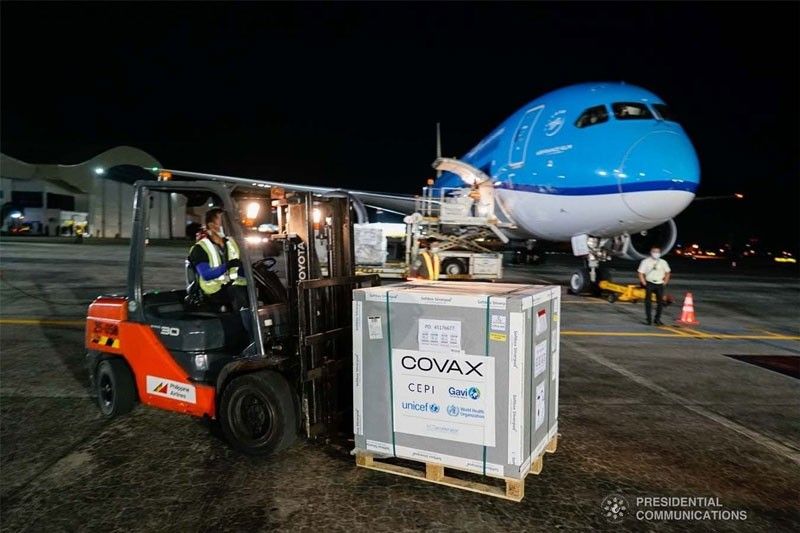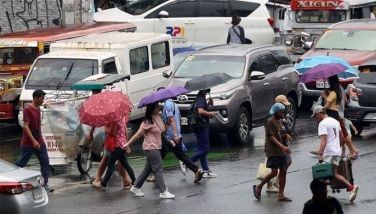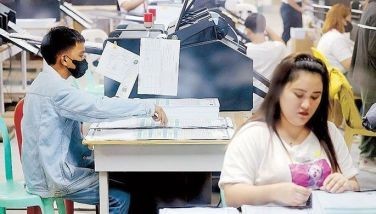Philippines sees ‘accelerated’ vaccine deliveries

MANILA, Philippines — The country is expecting the delivery of COVID-19 vaccines to be supplied by the COVAX Facility as early as next month, composed mostly of what the government said were delayed batches, the National Task Force (NTF) Against COVID-19 said yesterday.
NTF chief implementer and vaccine czar Carlito Galvez Jr. said about seven million to eight million doses could be delivered in May.
“We will be having what we call accelerated deliveries this coming May and June. This coming May, maybe we can have about seven to eight million. We are just waiting because there were delays with COVAX,” Galvez said in an interview aired over Teleradyo.
Last month, Galvez announced a delay in the delivery of COVID-19 vaccines to be supplied by the World Health Organization-led COVAX, citing logistical issues faced by vaccine manufacturing companies in countries where they are situated, like the Serum Institute of India, which had to address new waves of infections in the South Asian country.
COVAX is a global initiative that seeks equitable access to COVID-19 vaccines for member countries.
Galvez said the global production and delivery of vaccines in Europe was also affected, but that the constrictions in vaccine production are expected to stabilize in June.
“We are just waiting for the delayed supplies because, with the COVAX (batches), had there been no delays, we could have gotten over six million (doses) of Pfizer and AstraZeneca,” he explained.
“That’s what we’re waiting for. Just in case we can have other supplies from COVAX, it’s going to reach, before the end of June, we can get more or less 10 to 15 million (doses),” Galvez said.
The Philippines is currently administering the China-made CoronaVac vaccine, and British drugmaker AstraZeneca’s vaccine. Galvez said the country hopes to have a portfolio of at least seven vaccine brands this year.
Meanwhile, the NTF also announced that the shipment of 15,000 doses of Gamaleya Institute’s Sputnik V vaccine, which was scheduled to arrive Sunday, has been pushed to Wednesday due to “logistical reasons.”
At least one to two million doses of Sputnik V are also expected to be shipped next month, with two million more expected in the next delivery in June. Sinovac is also expected to deliver two million doses next month and 4.5 million in June.
Galvez earlier said Pfizer—whose scheduled delivery of vaccines to the country last month was snagged by the lack of an indemnity clause—is expected to deliver 195,000 doses by the end of the month.
He said an initial 194,000 doses of Moderna vaccine could “hopefully” arrive next month.
The government is also looking to secure negotiations soon for five to 10 million doses of Johnson & Johnson’s COVID-19 vaccine.
The government’s total vaccine budget for this year is P82.5 billion, coming from Bayanihan 2 funds, total unprogrammed appropriations, and funds from the Department of Health—with the aim of vaccinating 50 to 70 million Filipinos by the end of the year.
Galvez said the country has inoculated at least 1.06 million out of 1.7 million health workers, over 200,000 out of nine million senior citizens, and about 228,000 out of 14 million Filipinos with comorbidities.
‘Time is of the essence’
The House of Representatives, under the leadership of Speaker Lord Allan Velasco, has taken the Food and Drug Administration (FDA) to task over the perceived delay in the approval of new drug applications, including potential medicines against COVID-19.
Rep. Michael Edgar Aglipay, chairman of the House committee on good government which conducted a joint probe with the committee on public accountability, reminded FDA director general Eric Domingo that delays only hamper government’s efforts to contain the virus.
“It is the mandate of this committee to identity malfeasance, misfeasance, and nonfeasance committed by public officials, and to make appropriate recommendation in aid of legislation,” the Diwa party-list congressman said.
The Speaker, along with Deputy Speaker Bernadette Herrera, jointly filed House Resolution 1711 calling for a congressional inquiry into the policies and guidelines for the registration, utilization, manufacture, distribution, or sale of COVID-19 treatment drugs.
Lawmakers lamented the unnecessary delay in the approval of Ivermectin and Leronlimab—as well as the lack of supply of Midazolam, Tocilizumab and other repurposed drugs—for the treatment of COVID-19.
Pending the results of local clinical trials on Ivermectin, Domingo pointed out that the FDA has granted some hospitals compassionate special permit for its use to treat COVID-19 patients, and that three hospitals have been allowed to prescribe such.
In her interpellation, Herrera of party-list Bagong Henerasyon said it is high time the FDA expand the list of drug products under emergency use to give doctors and patients more choices in COVID-19 medicines.
To address the lack of supply of repurposed COVID-19 drugs, Herrera called on the FDA and the Department of Health (DOH) to strengthen the capacity of local drug manufacturers to address the pharmaceutical needs of the public.
“We should actively push for self-sufficiency of our own pharmas to ensure accessibility and affordability of life-saving drugs,” she pointed out.
Herrera also asked the DOH to consider suspending DOH Order 2013-0021 that requires local pharmaceuticals to register with the 33-step ASEAN guidelines before they can manufacture and market prescription drugs, and go back—for the meantime—to the 12-step national guidelines.
FDA calls for ‘flexibility’
The unprecedented nature of the global pandemic has forced the FDA to call Congress for an amendment to its mandate, where approval of medicine use remains as it were during “normal” times.
“The FDA really needs flexibility, especially in times of emergencies like this, as well as support for the local pharmaceutical industry,” Domingo told the House joint committee on good government and public accountability in a Zoom hearing last week.
“That’s what we are requesting because the FDA, under its mandate, does not have any emergency (laws). We’re asking Congress to give us the power so that we can move in times of emergencies, and have a little flexibility in our regulations,” he expounded.
“We don’t have a law for emergencies. It seems that our current law, Republic Act 9711, doesn’t have provisions for emergency situations. The only executive order that allowed us for the EUA (emergency use authorization) is EO 121 of President Duterte,” Domingo explained further.
“That’s why we were able to give emergency use authorization for our vaccines,” he related.
In December 2020, the Chief Executive allowed the FDA to issue an EUA for COVID-19 drugs and vaccines.
Velasco initiated the hearing, along with Herrera, where the chamber sought to check into the policies and guidelines for government agencies in the registration, utilization, manufacture and distribution of the drugs.
At the same time, Domingo told lawmakers in the same hearing they might issue a certificate of product registration (CPR) sooner for Ivermectin rather than EUA, which usually takes longer.
‘More detailed’ guidelines
As more vaccines are expected to arrive and the list of sectors for priority vaccination grows long, the government must set “more detailed” guidelines on the inoculation of Filipinos, Sen. Bong Go said yesterday.
Go asked the national government to firm up necessary guidelines and procedures of the National Vaccine Roadmap as the vaccine rollout is expected to reach the A4 priority category in the coming months.
“I’m happy that priority sectors continue to get vaccinated. We’re just prioritizing health workers, senior citizens and those with comorbidities, and after that, essential sectors and indigents and other members of society,” he said in Filipino.
Go said the ongoing vaccination of A1 to A3 priority groups is just the first step, and the processes may become more complex as the rollout reaches other sectors of society.
He said such guidelines are necessary to ensure the “orderly, efficient and effective” vaccination process.
Go also supported the appeal of seafarers and other overseas Filipino workers (OFWs) to consider the requirements needed for them to resume their work abroad, such as the need to be inoculated with vaccines that are acceptable in their country of destination, as well as the necessary documentation to prove that they have been vaccinated.
Go, who chairs the Senate committee on health, said aside from vaccinating workers who play essential roles in the community, government must also ensure that overseas-bound workers are able to resume their work abroad because they had been appropriately inoculated with vaccines compliant with the regulations of their countries of destination.
Since certain countries where these seafarers are bound to be deployed have preferences in terms of vaccines, he suggested that seafarers and other OFWs can be prioritized once doses from Western countries, like Pfizer and Moderna, arrive in the Philippines.
Noting that members of this sector cross international borders all the time and may need to provide proof of vaccination as a requirement for entry in some of their ports of call, Go also asked the government to provide acceptable proof of vaccination to these workers.
Under Section 12 of Republic Act 11525, the DOH is tasked to issue a vaccine card to all persons vaccinated. To expedite the process, the health agency may delegate the processing and issuance of vaccine cards to local government units and private entities, subject to guidelines to be promulgated by the DOH. – Delon Porcalla, Paolo Romero
- Latest
- Trending






























